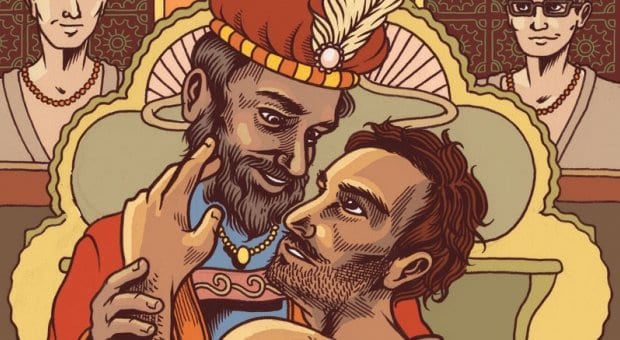Heterosexuality and monogamy are, to put it briefly, fairly recent developments, though love and devotion have been human concerns for eons. Religious leaders pushing “traditional marriage” have continuously failed to acknowledge a long history of non-monogamy and non-normative sexualities.
The famous Islamic leader Mahmud of Ghazni, an early-11th-century conqueror and the first ruler to carry the title “sultan,” had nine wives and relationships with other women, though his polygamy is often overlooked in lieu of his relationship with a man named Ayaz.
Mahmud was born in 971, in the town of Ghazna, Khorasan (what is now Afghanistan). At the age of 23, he joined his father, a Turkic slave-soldier turned nation-founder, in military campaigns in the region. He eventually took over from his father and in the name of Islam continued to expand the Ghaznavid Empire into what is now eastern Iran and the northwest Indian subcontinent.
Less is known about Ayaz’s early life. Likely born closer to the end of the 10th century, Ayaz was a Georgian-Turkish slave who ended up in Mahmud’s court and became the sultan’s favourite. In 1021, the sultan raised Ayaz to kingship, installing him on the throne of Lahore, a city in what is now Pakistan. Mahmud had burned the city to the ground and scattered most of the inhabitants because of a betrayal by the local government, so the freshly instated Malik (“King”) Ayaz reconstructed Lahore from the ground up, creating what survives as the Walled City.
The relationship between Mahmud and Ayaz is highly celebrated in Persian poetry and literature. Sa’di, a 13th-century poet, includes two stories about the lovers in his best-known work, Bustan, a collection of reflections on human nature. The chapter “Concerning Love” describes someone complaining that Mahmud’s favourite slave “possesses no beauty.” Upon hearing this, Mahmud responds, “My love, O sir, is for virtue, not for form or stature.” The second story depicts the king travelling with some of his men when an overturned chest of pearls is discovered; all except Ayaz go after the pearls. Questioned by Mahmud about the possibility of gaining riches, Ayaz explains he wants nothing. “I walked in haste behind thee, I do not occupy myself with riches away from thy service.”
Mahmud and Ayaz’s relationship came to be an allegory of the highest ideal of (spiritual) love, devotion and fealty, be they to a god, king or lover. Chief among these virtues is restraint, as expressed in a story by Nidhami-I-Arudi, a 12th-century Ghaznavid court poet from Samarkand (what is now Uzbekistan). His story in the Chahar Maqala describes the “well known and famous” love of Mahmud for Ayaz, though he explains that Mahmud, being a “pious and God-fearing man,” wrestled with this love. One night after drinking a lot of wine, Mahmud couldn’t ignore Ayaz’s beauty: “Thereupon love plucked the reins of self-restraint from the hands of his endurance, and lover-like he drew him to himself.”
A manifestation of his morals appears, warning Mahmud against acting on his love. Instead, the sultan takes a knife and orders Ayaz to cut off his beautiful hair. Mahmud wakes up the next morning, hung over and depressed by what he’s done. A court poet is called, who comes up with this pithy verse: “Though shame it be a fair one’s curls to shear/ Why rise in wrath or sit in sorrow here?/ Rather rejoice, make merry, call for wine/ When clipped the cypress doth most trim appear.” Cheered considerably, Mahmud lavishes gold and silver on both the poet and his beloved. Mahmud’s virtues are preserved, Ayaz has a new haircut, everyone wins.
While it’s easy to romanticize chaste devotion in stories, it’s harder to believe that lust didn’t win out with real-life Mahmud and Ayaz. While homosexuality or polygamy might ruin Mahmud’s chance of being a “pious and God-fearing man,” Sa’di advises, “A devoted lover holds not back his hand from the object of his affections though arrows and stones may rain upon his head. Be cautious; if thou goest down to the sea, give thyself up the storm.” Through Mahmud’s love and devotion to Ayaz, in a narrative that would make Sa’di proud, the ruler is ruled by his slave.


 Why you can trust Xtra
Why you can trust Xtra


